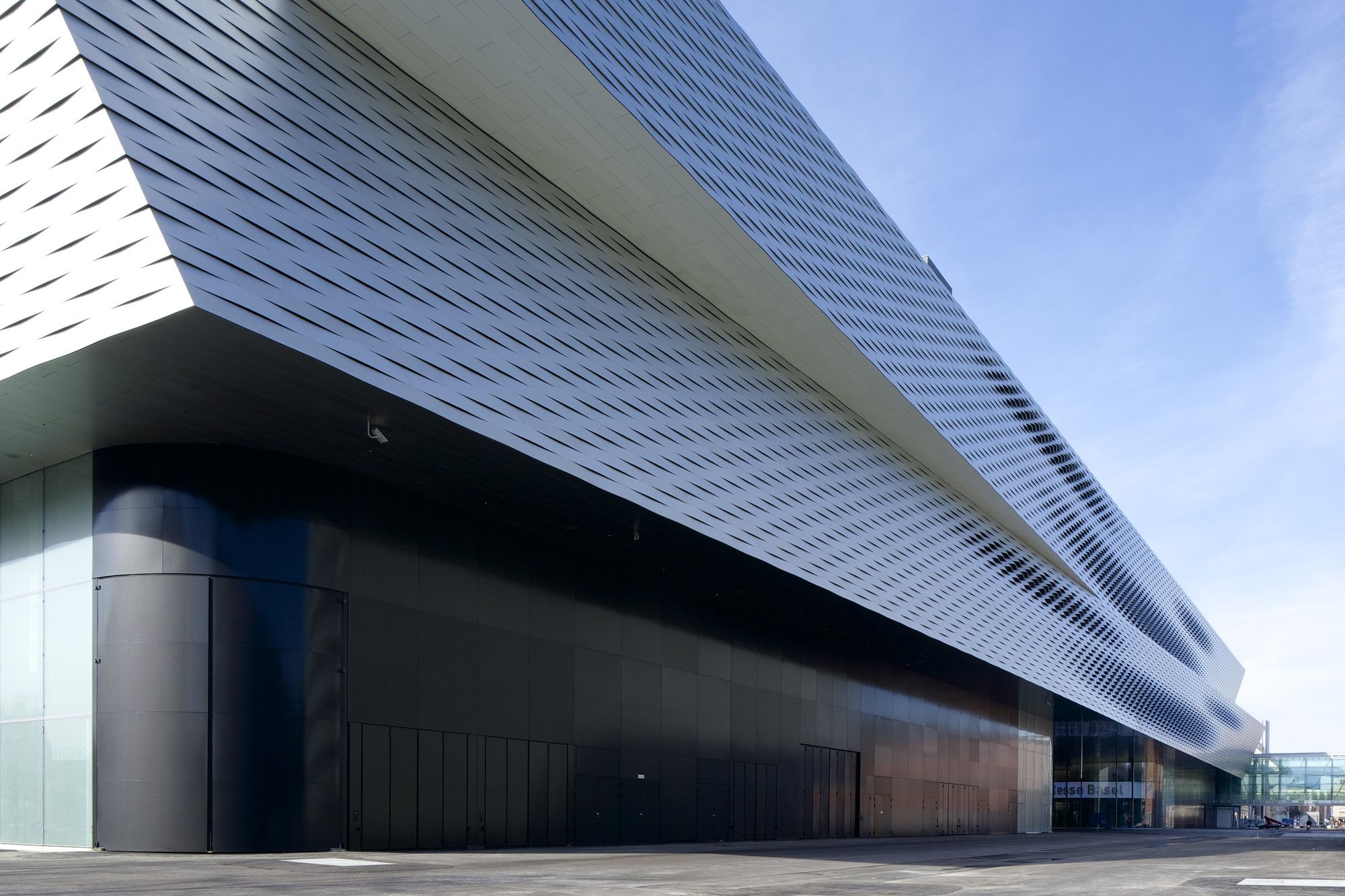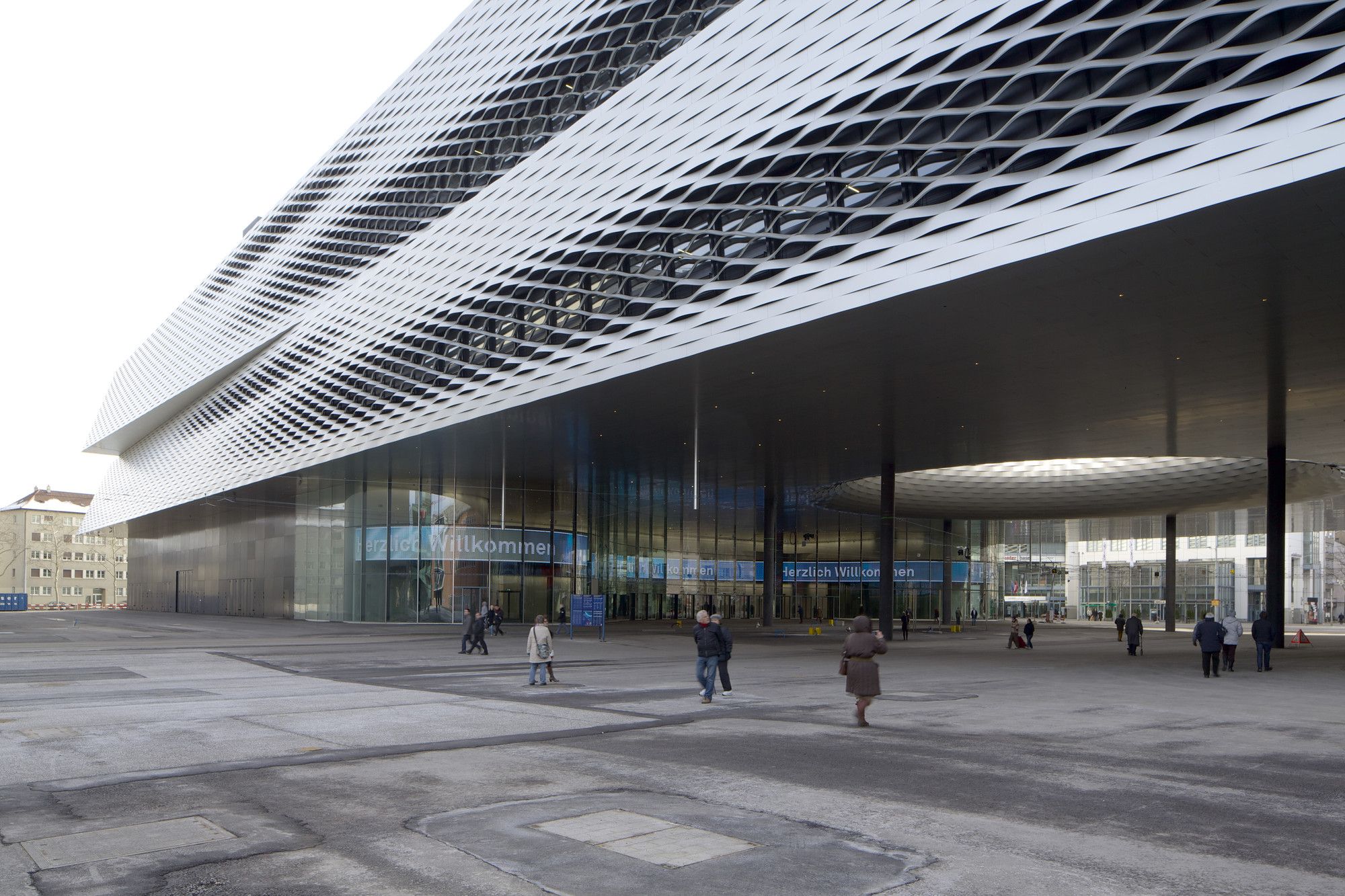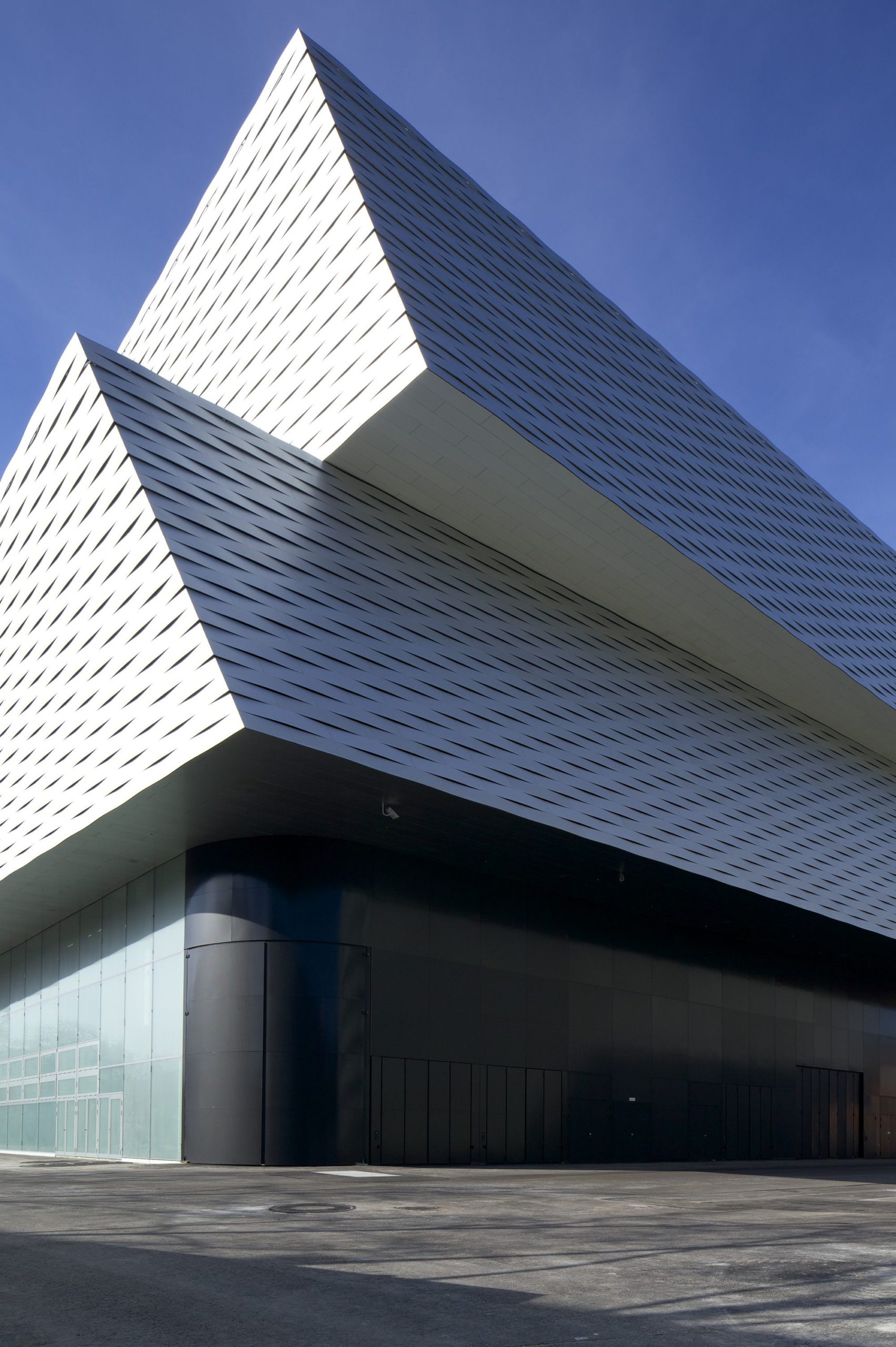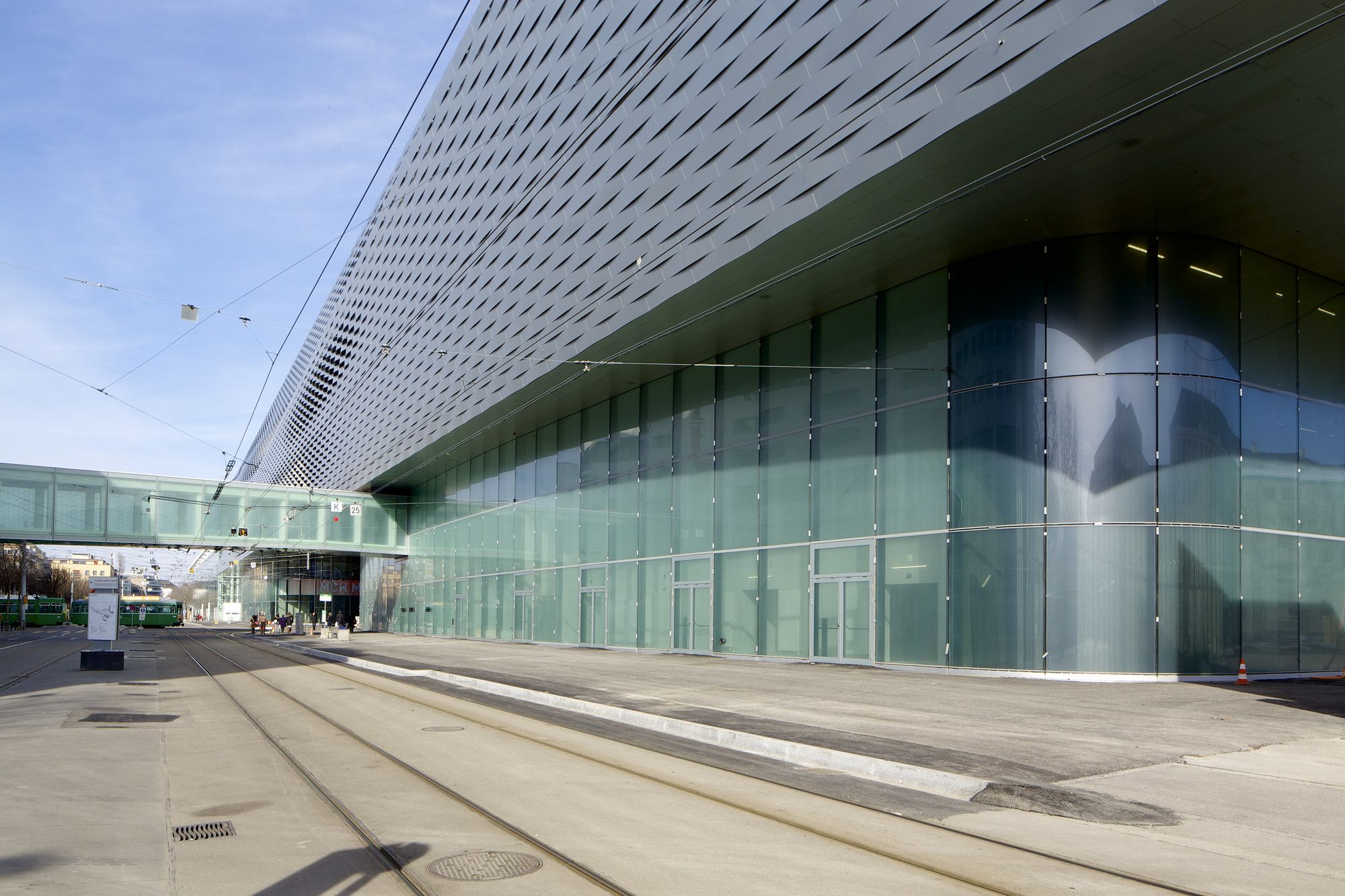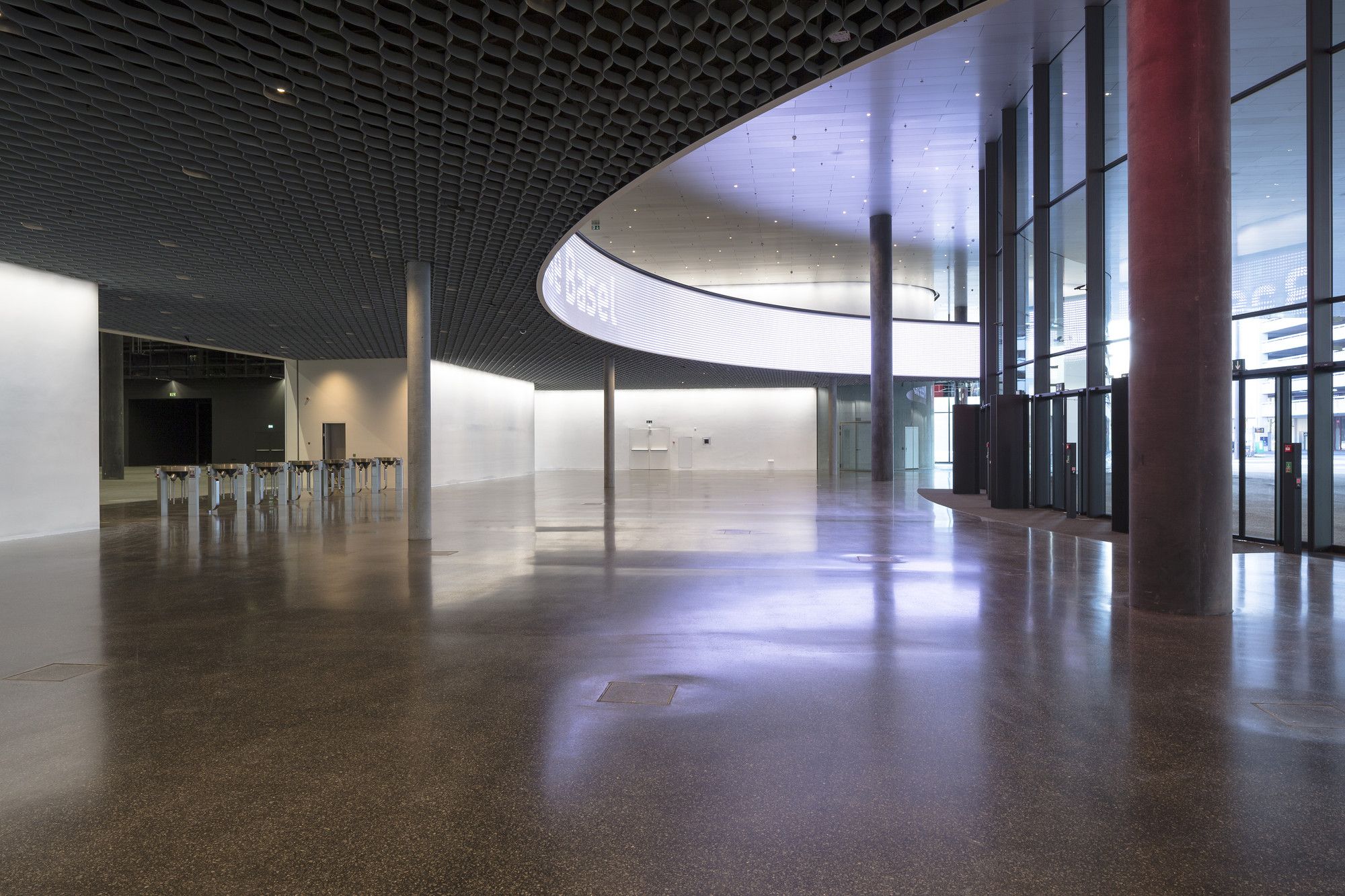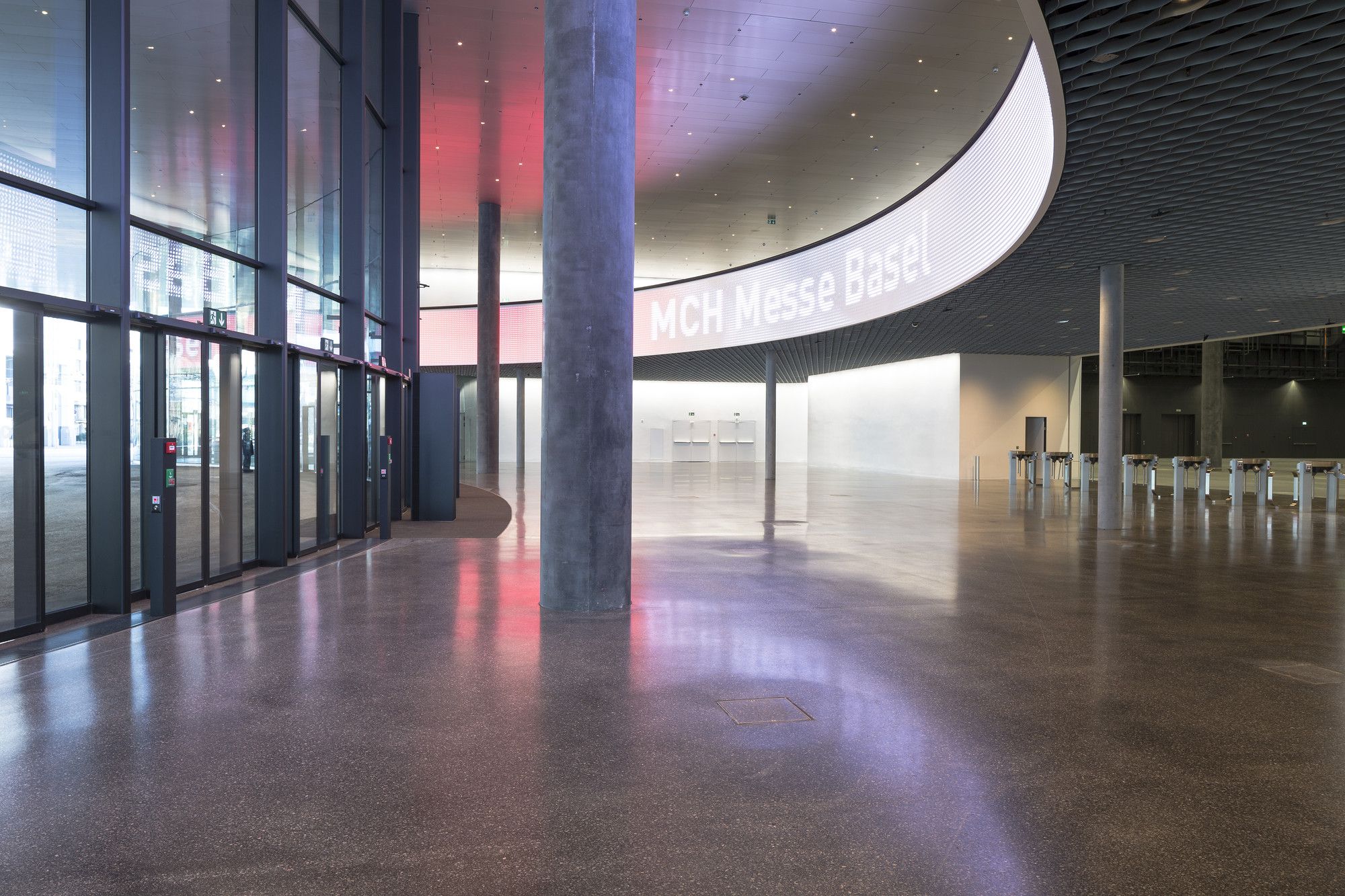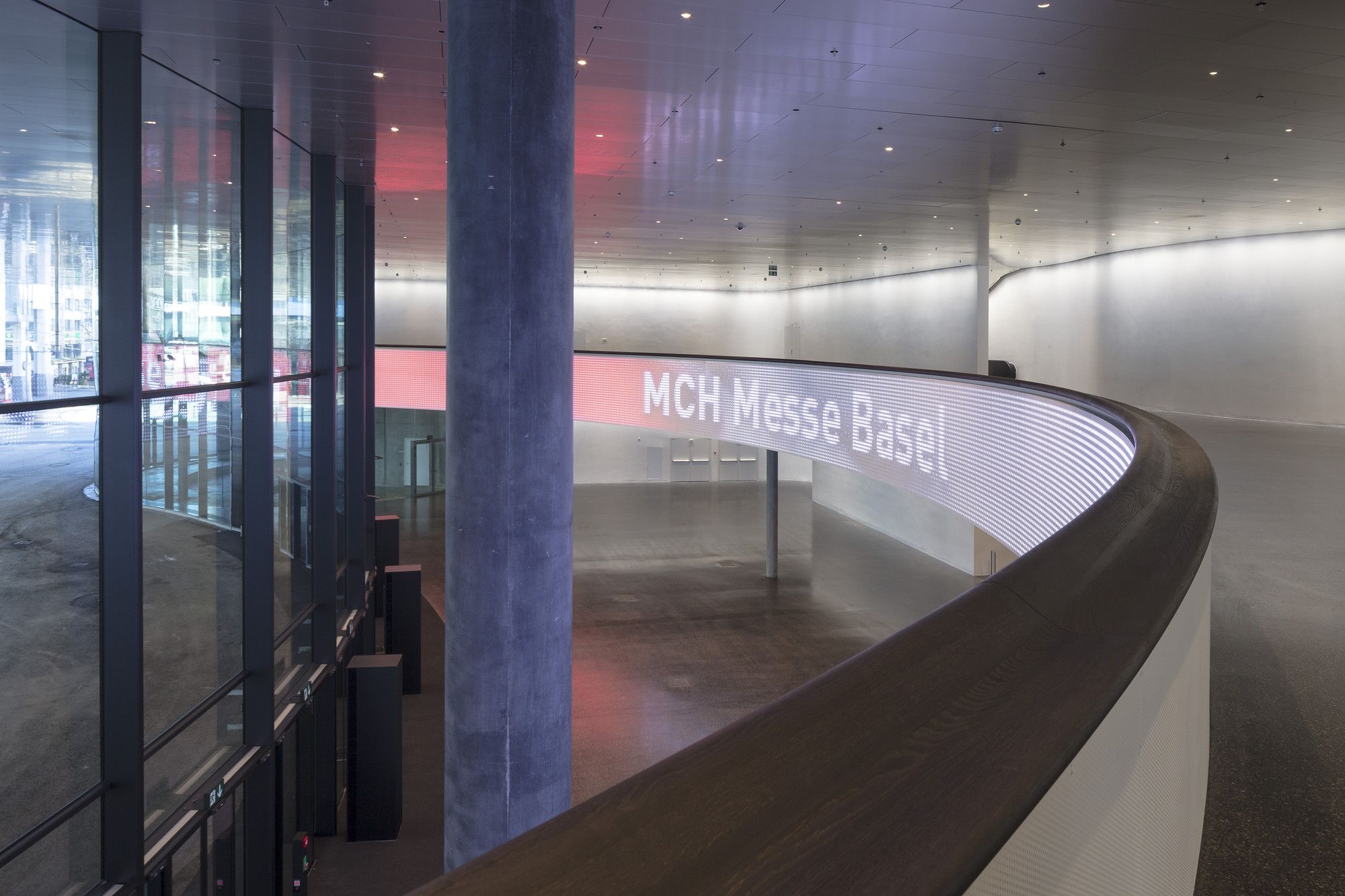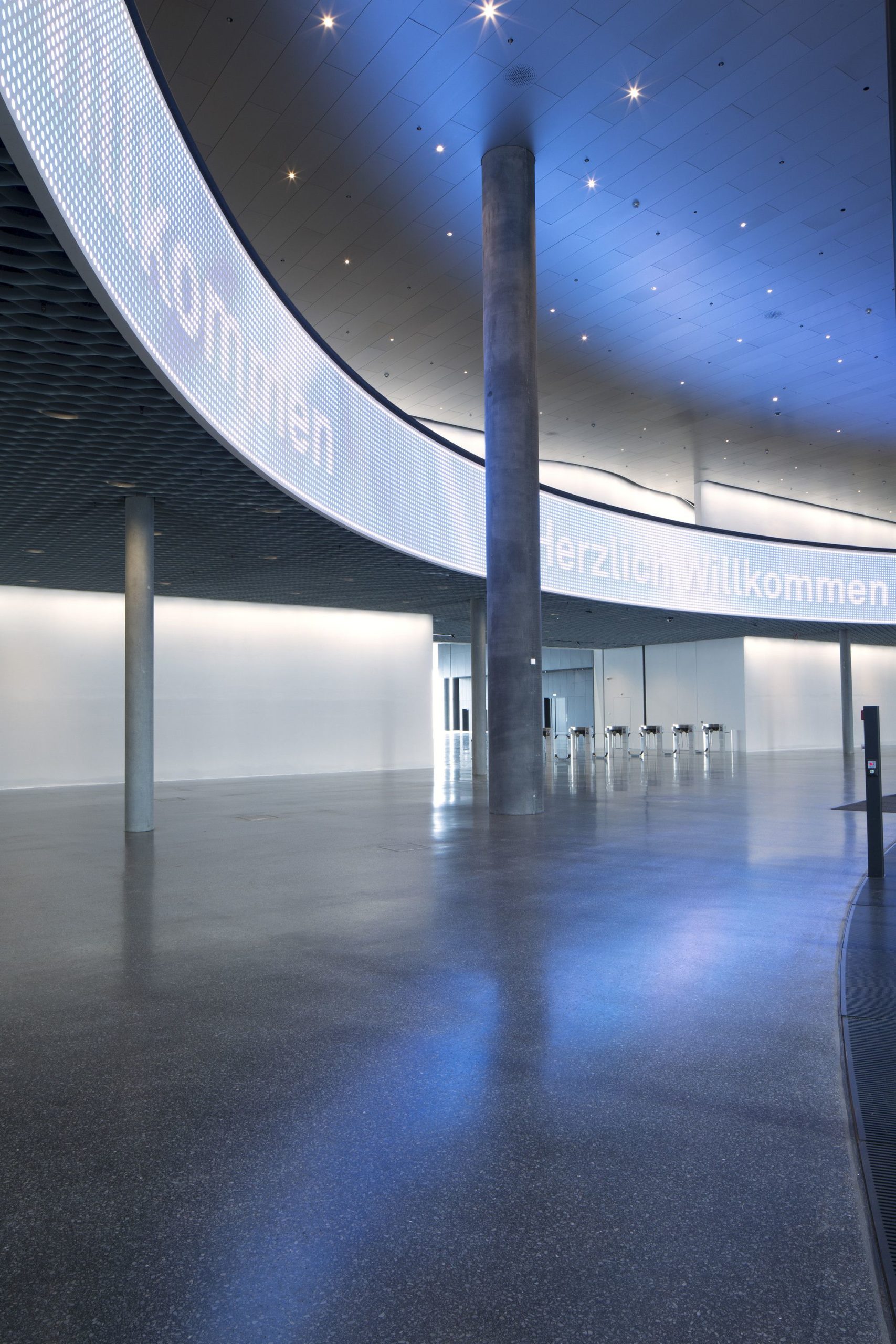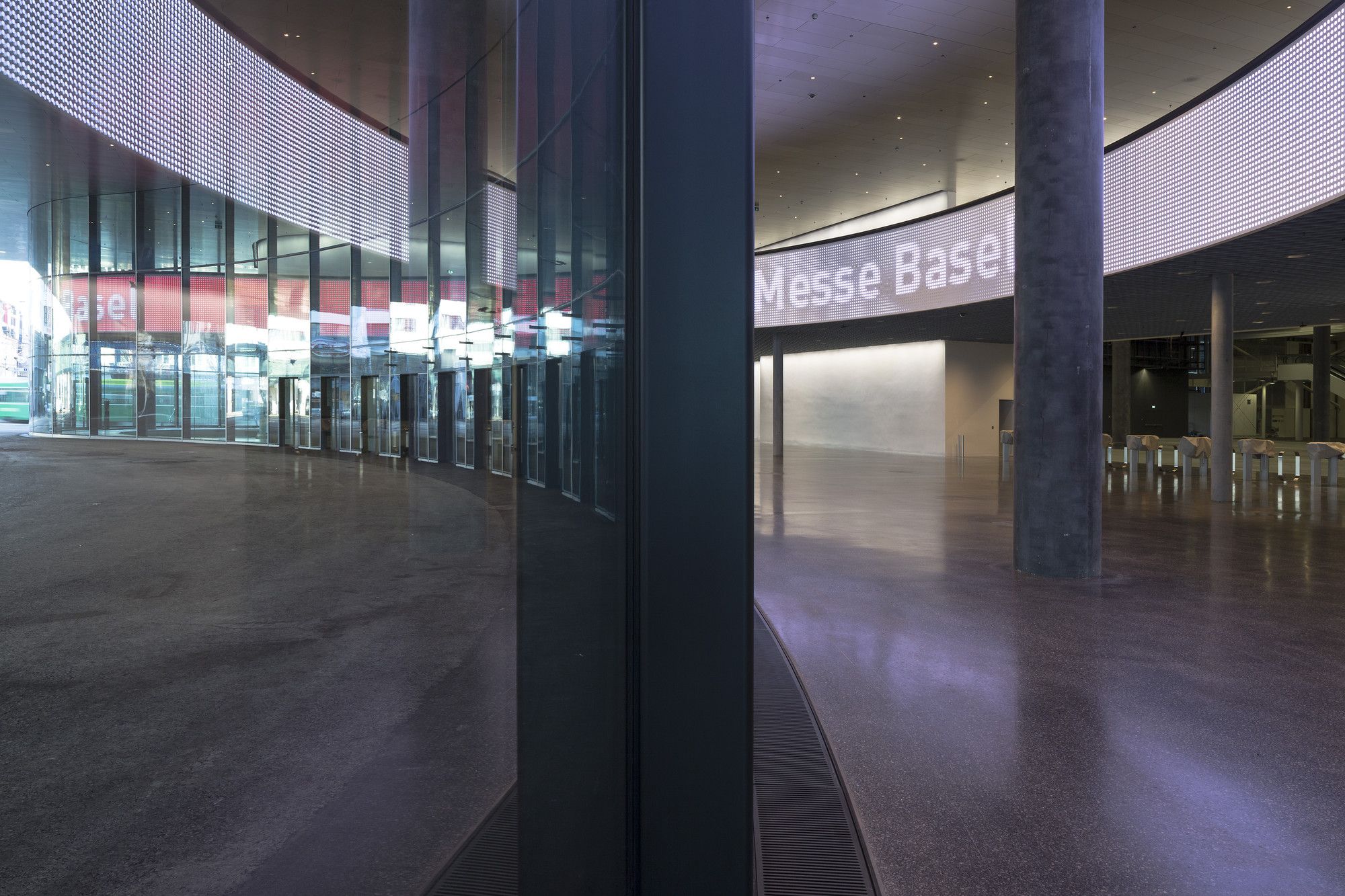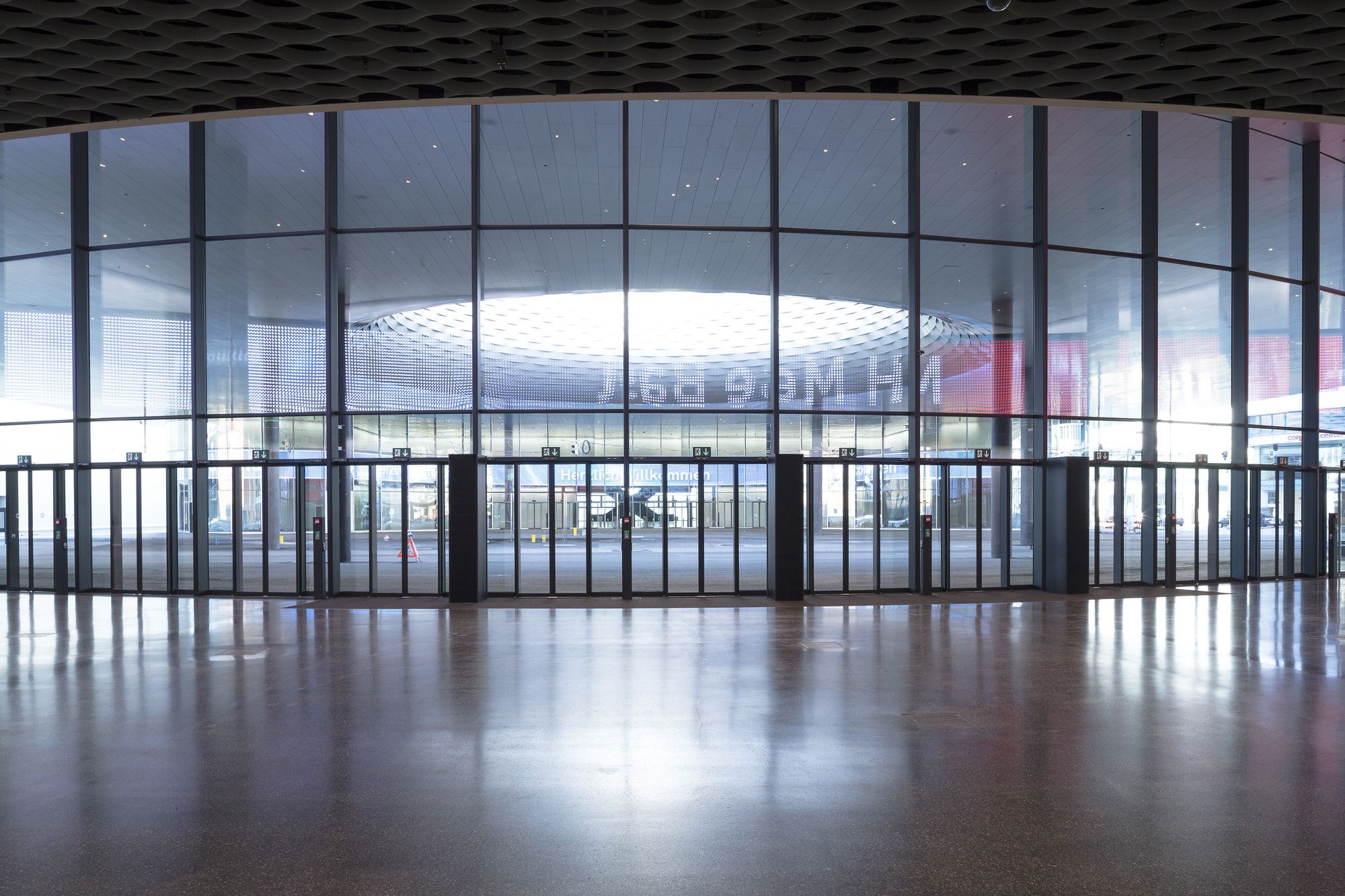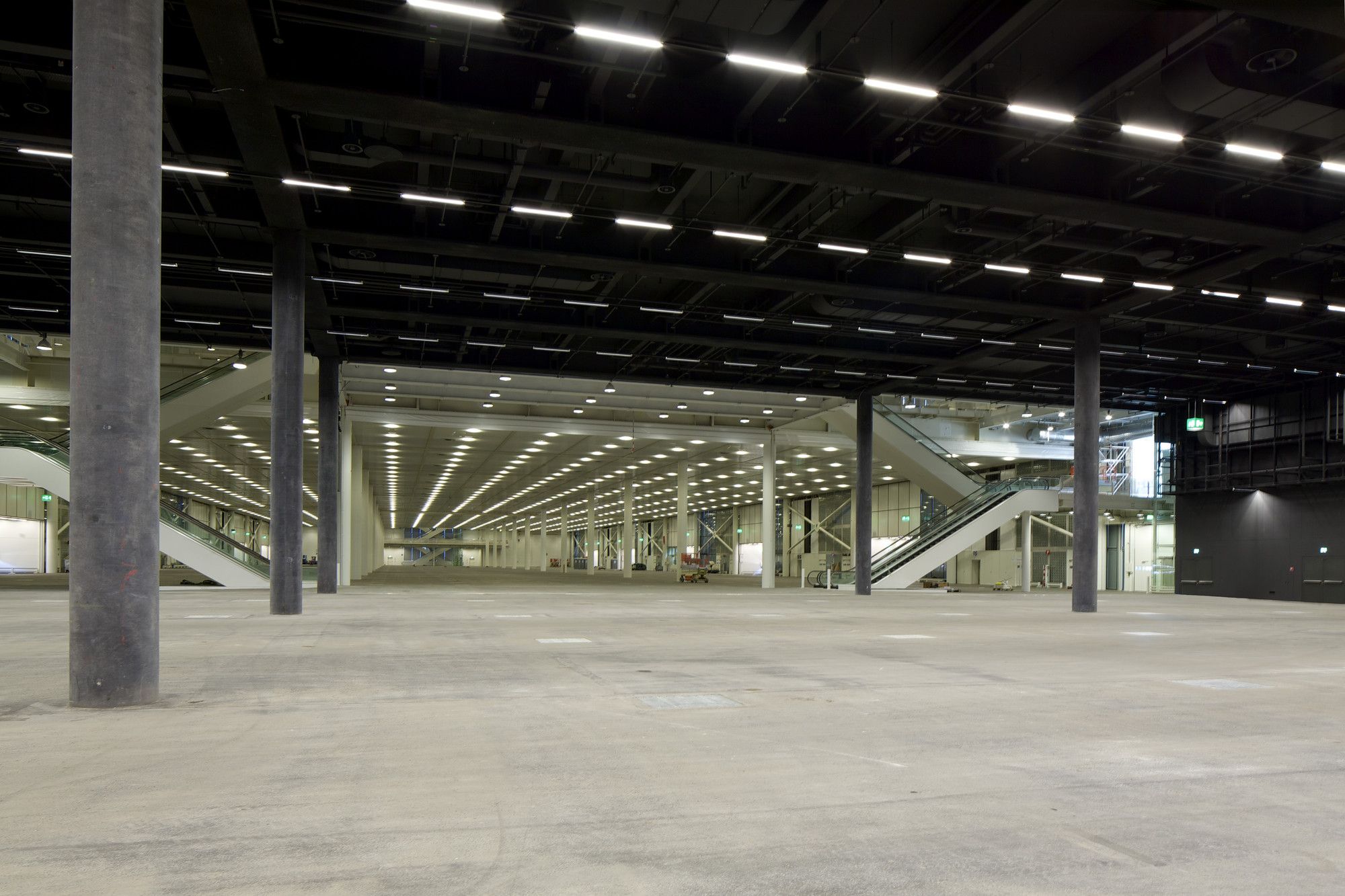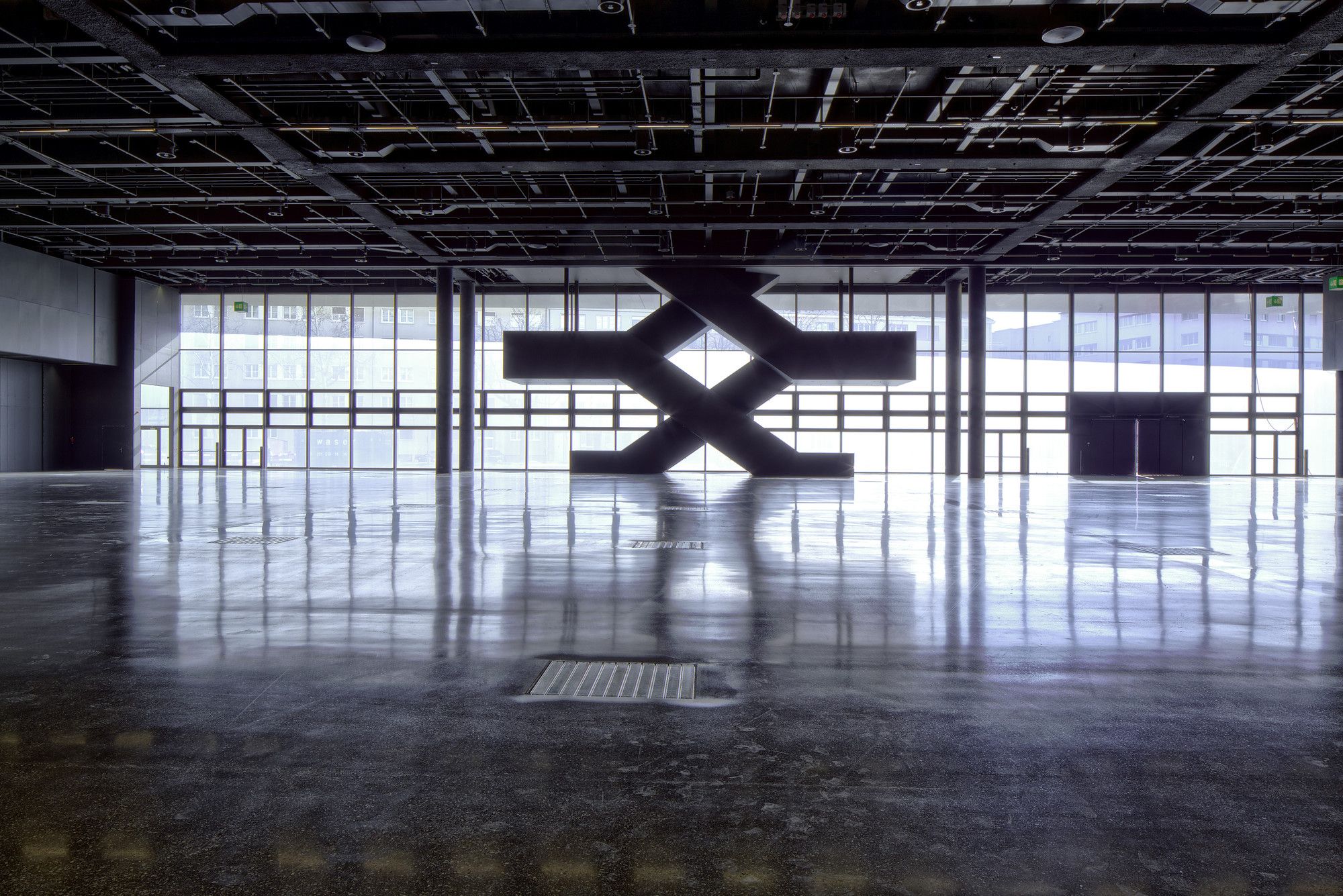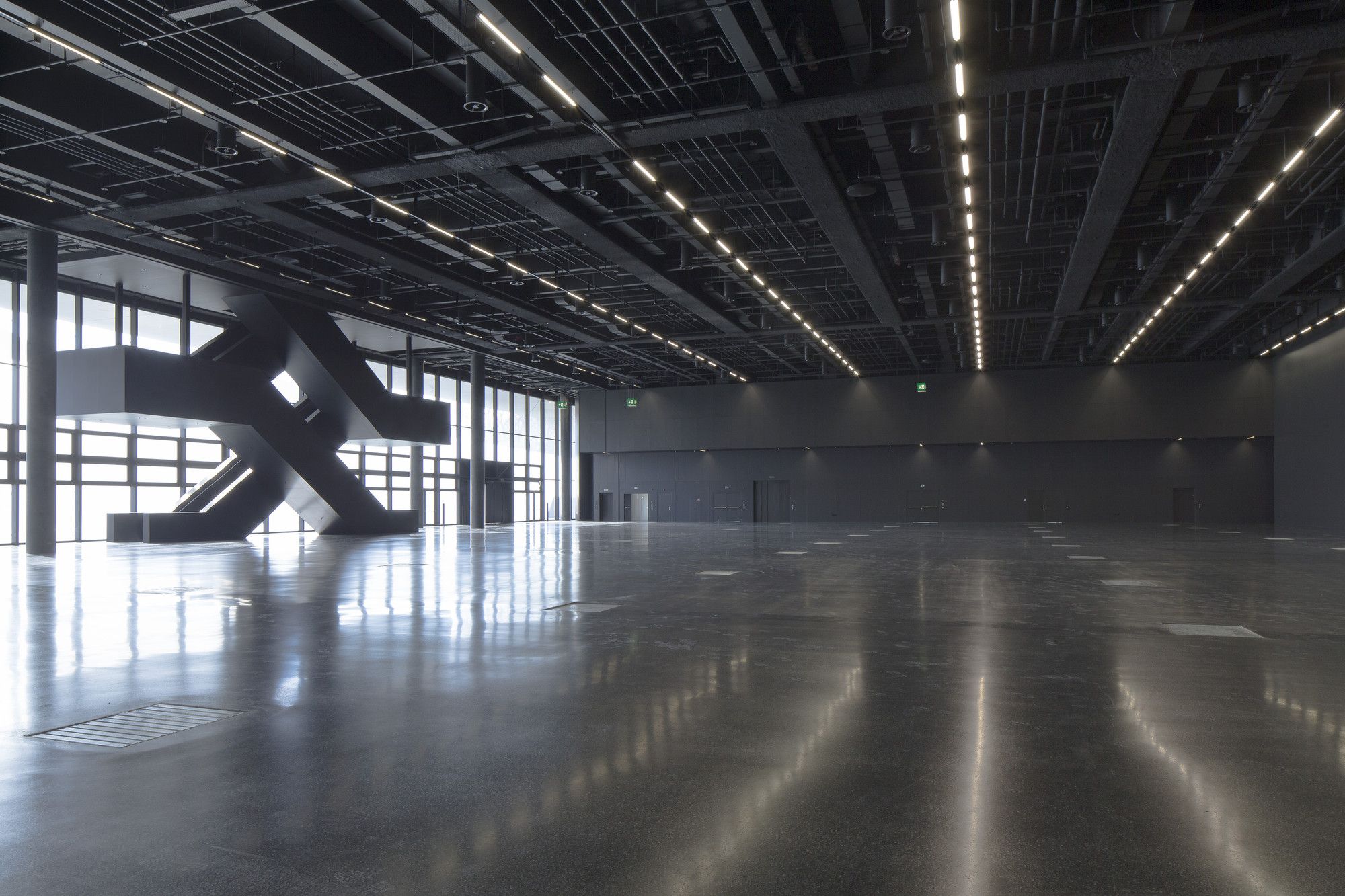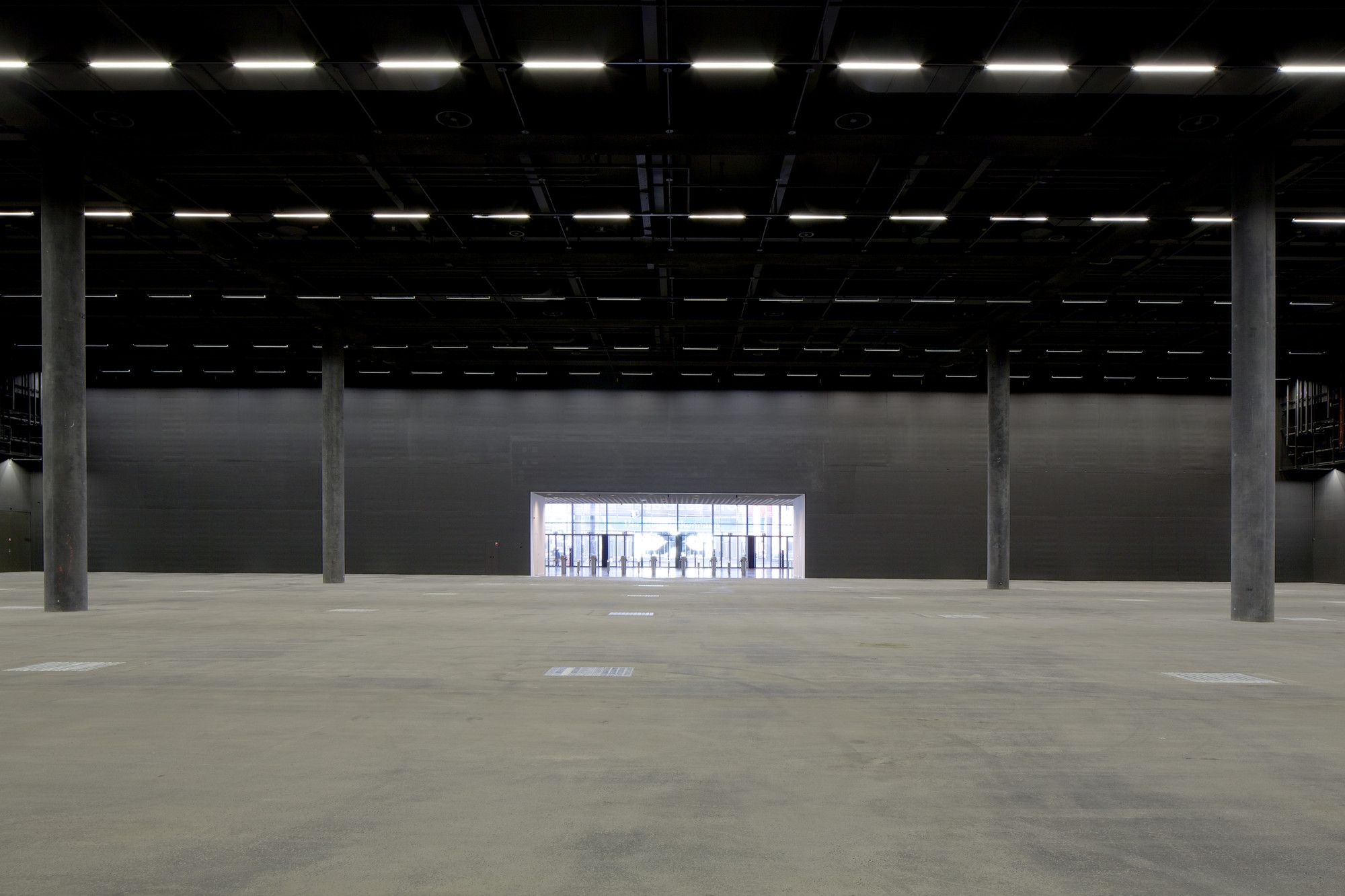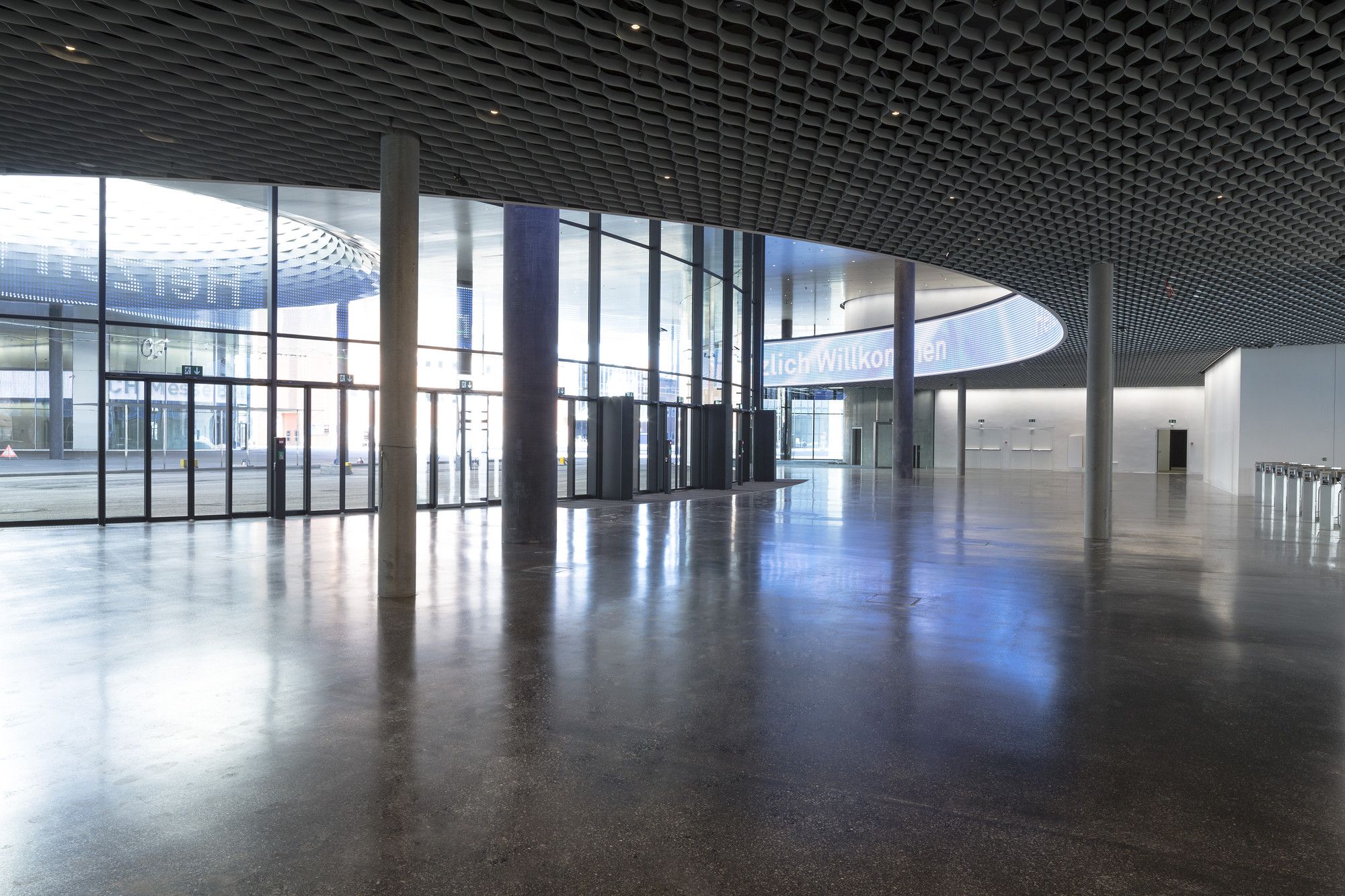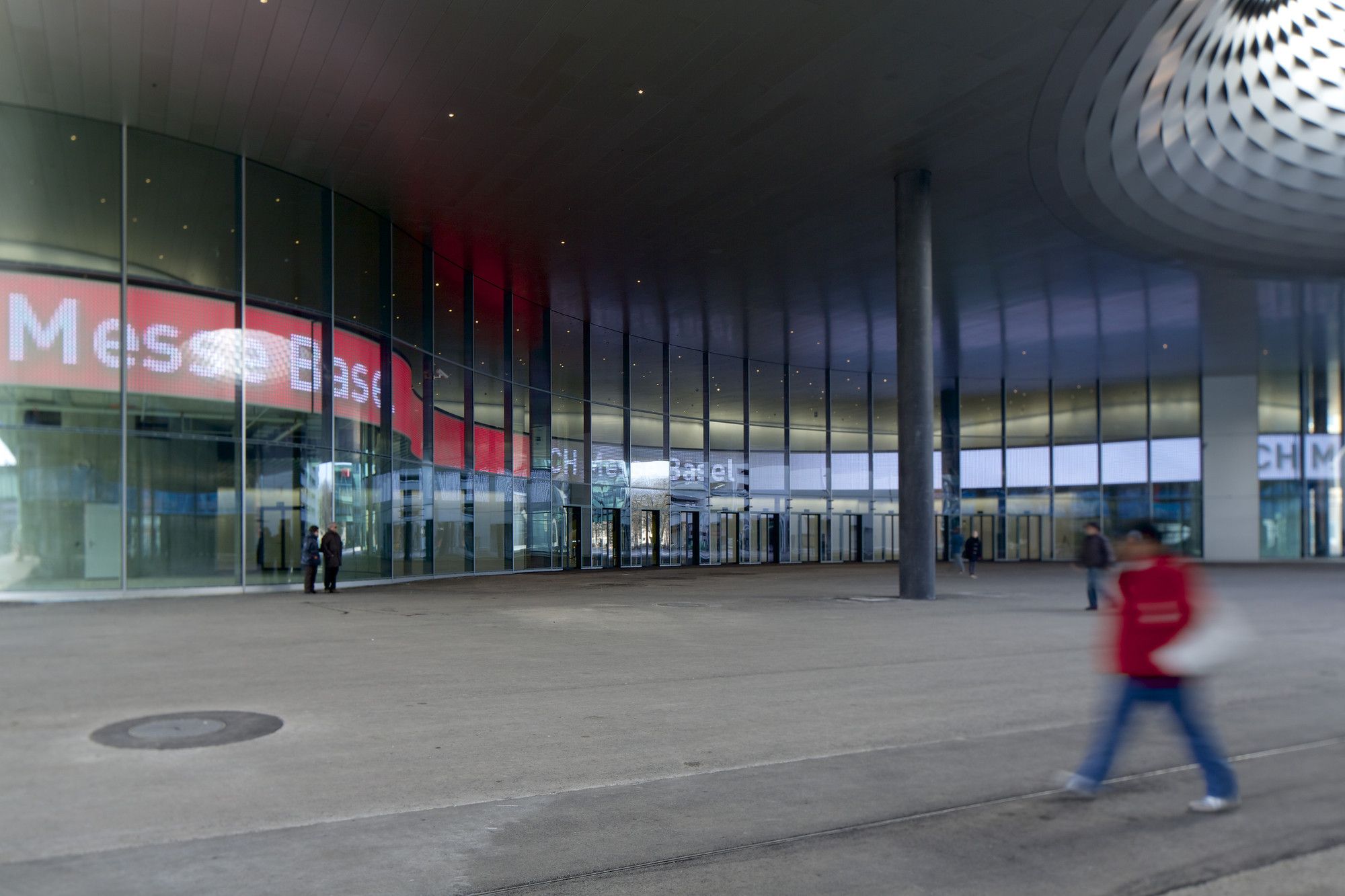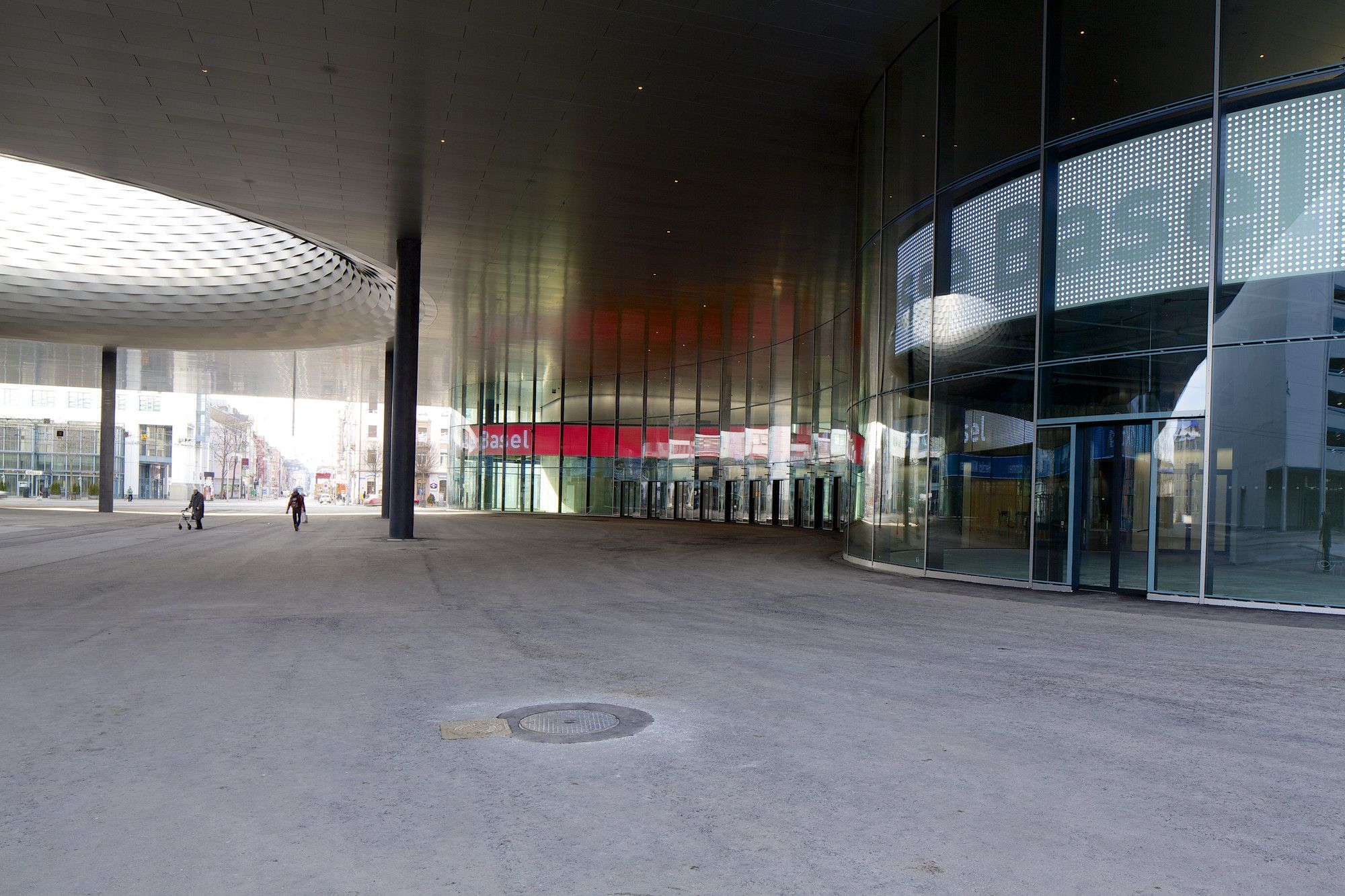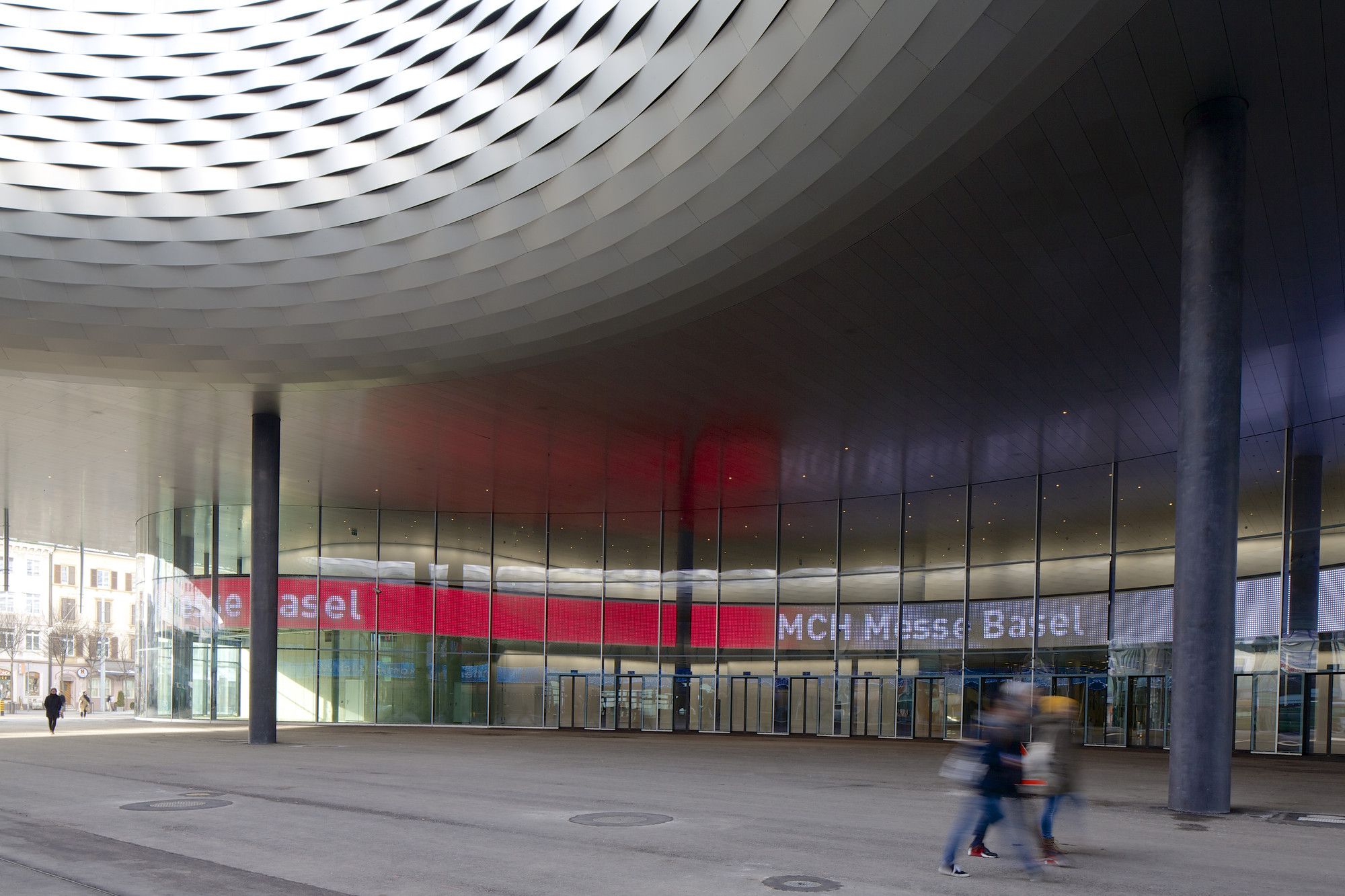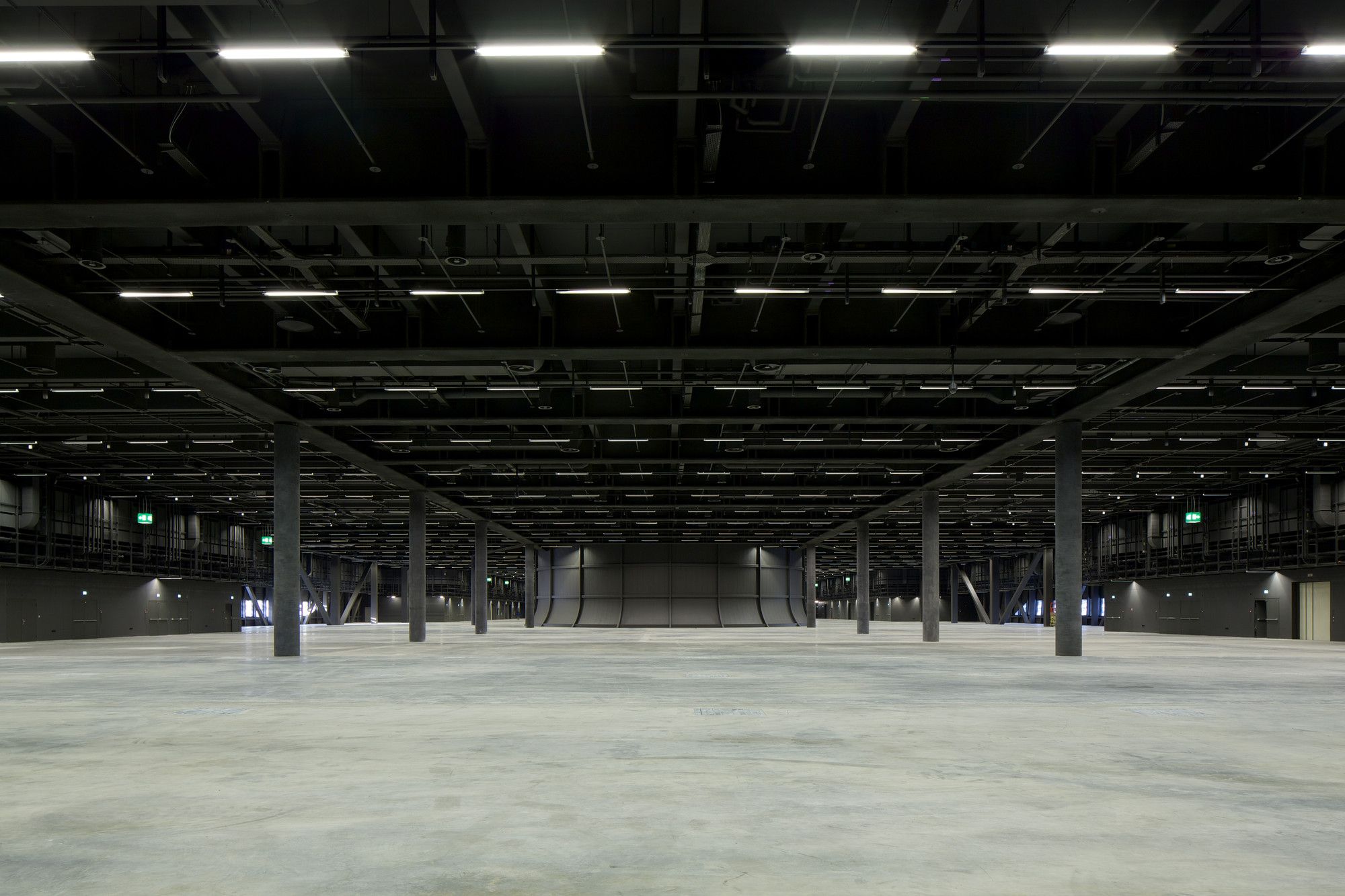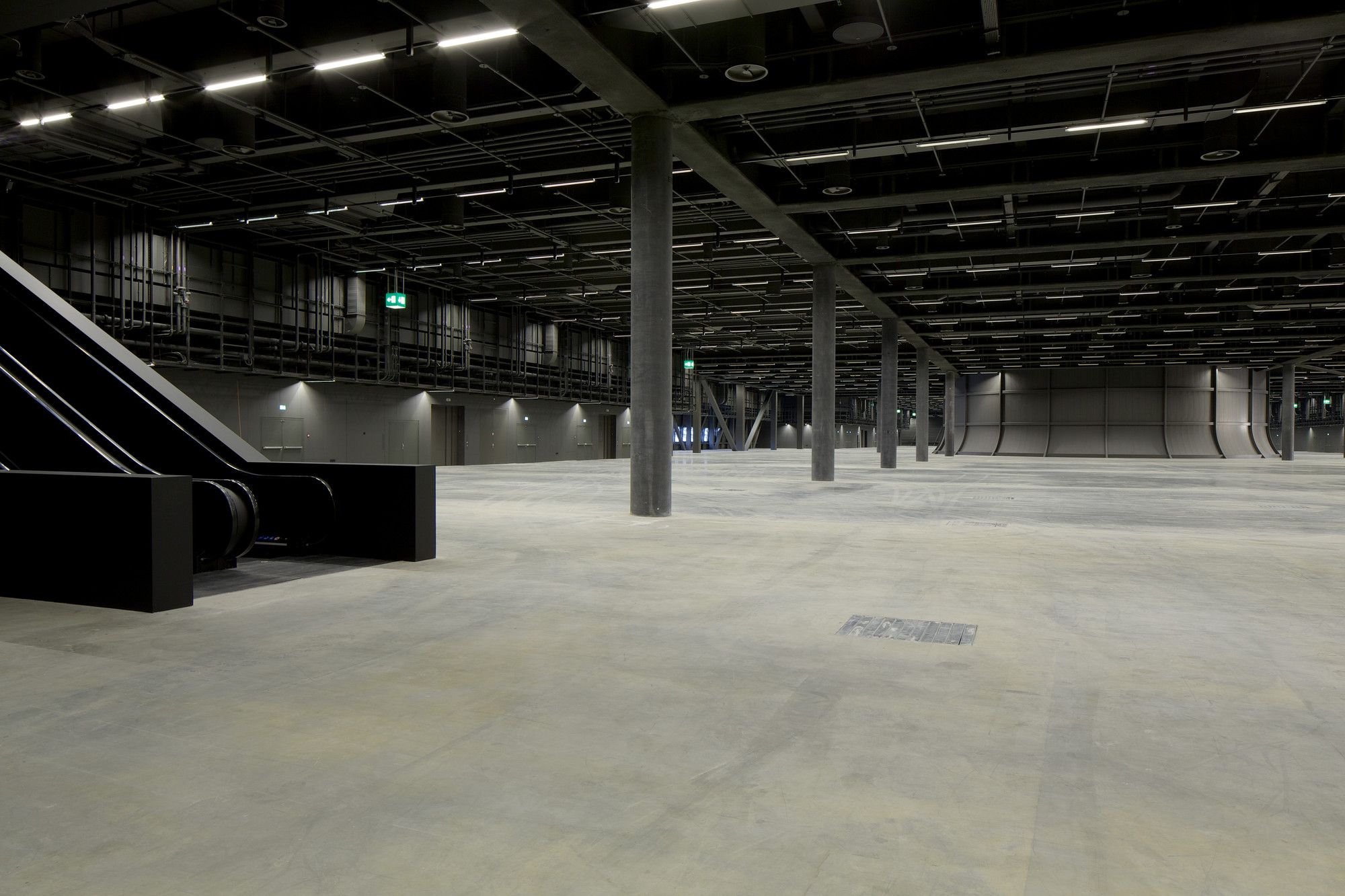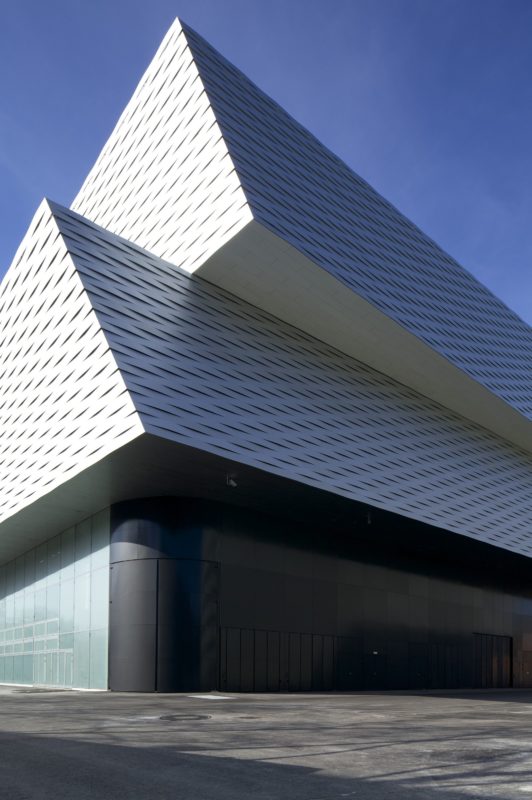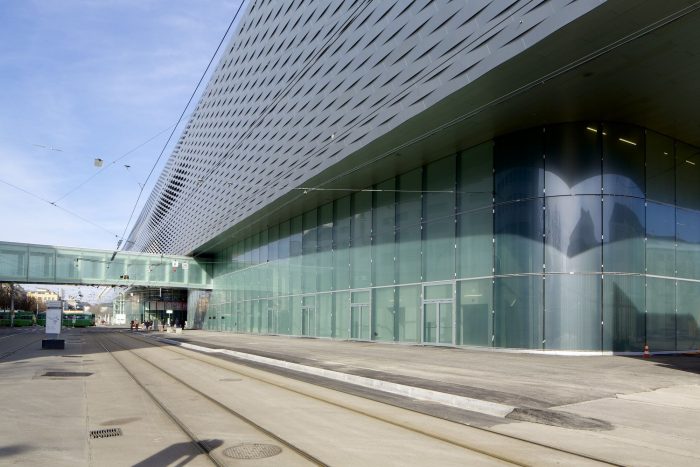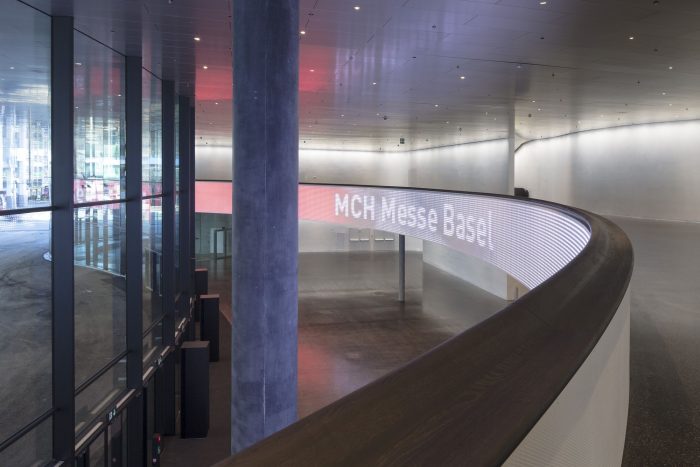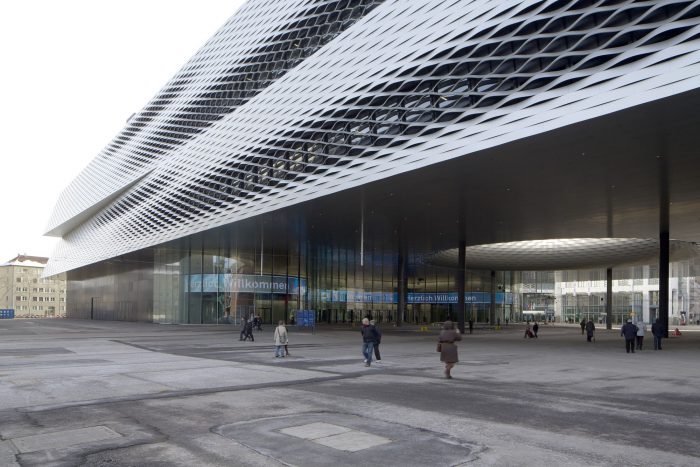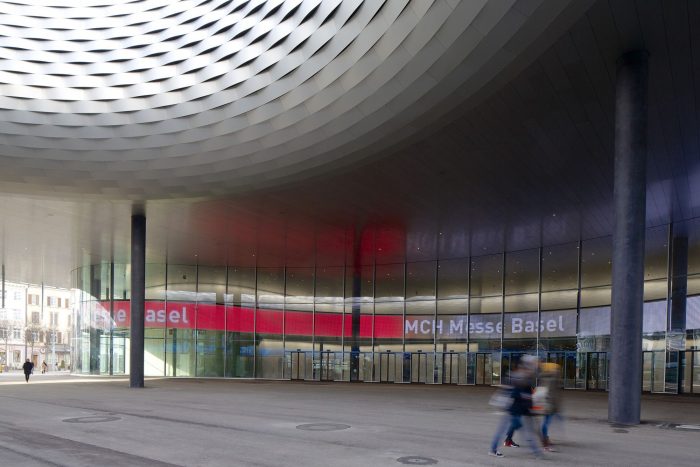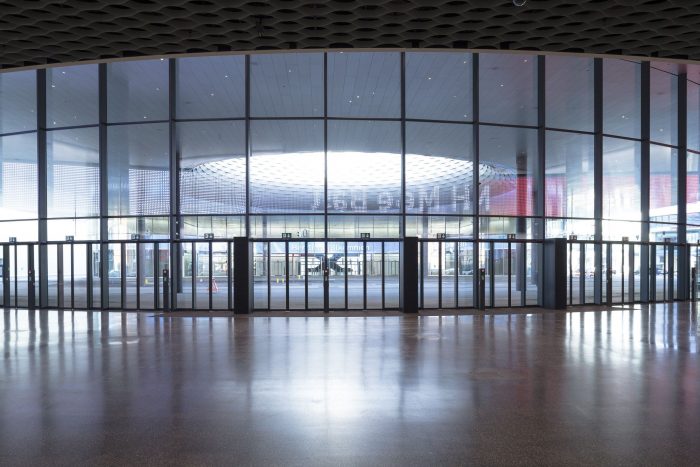Messe Basel New Hall
The concentration of exhibition halls around the Messeplatz (Exhibition Square) is the key entrepreneurial aim of the Messe Basel leadership in its further development. Building the Messe Tower and replacing Hall 1 with a highly modern building and optimum exhibition areas were the first components in this strategy, followed by the continuing construction of new halls.
This concentration of exhibition centre activities is also an important urban planning matter for the development of the surrounding Kleinbasel neighbourhood, aimed at regaining outlying exhibition spaces on the present Deutsche Bahn (German Railways) area for apartments, offices and small businesses while simultaneously upgrading the Messeplatz as a focal point in Kleinbasel.
Achieving this entrepreneurial as well as urban planning aim of congegrating the Messe and at the same time retaining the important Watch and Jewellery Fair within Basel, required the replacement of two halls on the Messeplatz (Hall 1 at the front and Hall 3). These halls no longer fulfilled modern exhibition requirements in terms of ceiling heights, column spacing or load bearing capacity of the floors. It was also important that all halls be interconnected to ensure flexibility for various events, and that nearby car parking facilities should be retained.
Fulfilling exhibition requirements for large volumes and uninterrupted floor areas, the New Hall is a three-storey extension of Hall 1 along the Riehenring. To provide indoor connection to all exhibition halls, the new building bridges over the Messeplatz and creates a covered public space, perhaps comparable to a railway station concourse or indoor market, realized in a modern design language. This key architectural and urban planning element defines the south end of the Messeplatz and is illuminated from above by a generous circular opening. Planned for many uses and events that will take place during and between exhibitions, and featuring restaurants and shops intended for a mix of international, local, exhibition, and public visitors, we have named this new outdoor hall the City Lounge. Open at all times, the City Lounge not only defines the entrance to the fair spaces, but will be a focal point of public life on Clarastrasse (the main shopping street in Kleinbasel) and will significantly enliven the street culture around the Messeplatz. For example, during the autumn fair the partially covered hall will create a fascinating atmosphere with smaller booths and aisles open to, yet protected, from the elements.
With the addition of the New Hall, current activities on the Messeplatz will continue, but they will take place in a space with different proportions. What was once an elongated rectangle that more or less ran into Clarastrasse without noticeable demarcation is now almost a square with clearer urban definition. A new “lane” between the New Hall and existing multi-storey car park offers better access to Messeplatz for pedestrians. Connecting east to the adjacent residential area around Riehenstrasse and Peter Rot-Strasse, this “lane” is a continuation of Isteinerstrasse and creates a new east-west link which integrates the Messeplatz into the quarter. Service and supply to the New Hall will be mainly through an underground route, thus reducing truck traffic on Riehenstrasse.
A new “lane” between the New Hall and existing multi-storey car park offers better access to Messeplatz for pedestrians. Connecting east to the adjacent residential area around Riehenstrasse and Peter Rot-Strasse, this “lane” is a continuation of Isteinerstrasse and creates a new east-west link which integrates the Messeplatz into the quarter. Service and supply to the New Hall will be mainly through an underground route, thus reducing truck traffic on Riehenstrasse.
The Messeplatz is a pedestrian and cyclist precinct. Together with the adjacent Rosentalanlage, the Messeplatz will be the main outdoor space for the many residents of the Messe district. The green belt along the Messeplatz- Wettsteinplatz link will be enhanced by more trees on Riehenstrasse to visually connect the exhibition centre to the Rosentalanlage.
What is an exhibition hall today?
Ideally, exhibition halls should be as spacious as possible, rectangular in layout, with wide spans and ceiling heights of around 10 m, in order to provide the flexibility and versatility required for exhibition purposes. In recent years, the demand for such generous spaces has further increased.
Taking Baselworld as a leading example of a modern international exhibition, where the halls are animated by the individual exhibitors’ stands, the goods on display and the crowds of visitors, the question of an exhibition hall architecture does not seem to be a primary demand. Architecture is only perceptible in public areas and stairways and only there can an interface with the wider public landscape of the city emerge. The best illustration of this is the round courtyard in Hall 2. Regrettably, this courtyard is only accessible during exhibitions as it is undoubtedly one of the most attractive public areas in Baseland, especially during Art Basel in June, one of the most successful urban meeting points in the whole of Switzerland. The City Lounge aims to turn the inward-looking architecture of the round courtyard towards the outside and to make it accessible all year round.
How do we design an exhibition hall on the outside?
Viewed from the outside, exhibition halls are actually nothing more than a stack of big boxes. They require very few windows and architectural distinctions are deemed as impractical restrictions on interior flexibility. The architectural results are generally composed of vast, monotonous facades of brick as in Hall 2 or glass for Hall 1. To avoid this repetitive sameness, we took a different approach for the New Hall.
The New Hall features three exhibition levels. The entrance level, the lowest, is at grade with the street and outdoor square, permitting a natural and casual coming-and-going. Ground floor entrances seamlessly link the City Lounge to the existing Hall 1, former Hall 3, the new event space for 2’500 spectators, and a number of shops, bars and restaurants in the foyers. The dynamic sweep of the street level facade reacts to the flows of people and corresponds to the space required at the tram stop and entrances to the exhibition centre and Event Hall. Here, large expanses of glass create the spatial transparency both necessary and appropriate in order to achieve the openness envisioned for the exhibition hall complex and the enlivening of public urban life. This vitalisation and acceptance will be crucial to the long-term success of the “Messezentrum in the city” concept. Above the ground will be two exhibition floors. To avoid the “big box” effect, the two upper volumes are offset from each other as separate entities, which indeed they are! The New Hall therefore consists of three individual elements, one on top of the other, each projecting over the street in varying degrees, and allowing them to respond to different urban conditions. From each point of view – whether from the Riehenring, Messeplatz or Riehenstrasse – the New Hall offers a different perception every time and thus avoids the monotony of uniform facade lines.
Above the ground will be two exhibition floors. To avoid the “big box” effect, the two upper volumes are offset from each other as separate entities, which indeed they are! The New Hall therefore consists of three individual elements, one on top of the other, each projecting over the street in varying degrees, and allowing them to respond to different urban conditions. From each point of view – whether from the Riehenring, Messeplatz or Riehenstrasse – the New Hall offers a different perception every time and thus avoids the monotony of uniform facade lines.
This constant architectural variation is reinforced, paradoxically, by applying a homogeneous material (aluminum) over all exterior surfaces. The facade of articulated twisting bands strategically modulates and reduces the scale of the large exhibition volumes to its surroundings. This is not simply a decorative element but a practical means to regulate the fall of natural light on adjacent properties and to frame specific views from individual spaces, primarily the social areas above the City Lounge, towards the public life of the city.
Architects: Herzog & de Meuron
Partners: Jacques Herzog, Pierre de Meuron, Stefan Marbach (Partner in Charge), Wolfgang Hardt
Projects Team:
Tobias Winkelmann (Associate, Project Director), Michael Schmidt (Associate), Stefan Hörner (Associate), Roger Huwyler (Project Architect), Roland Schreiber (Project Architect); Philip Albrecht, Israel Alvarez Matamoros, Michael Bär, Axel Beck, Marcelo Bernardi, Benito Blanco Avellano, Alexander Bürgi, Amparo Casaní Arazo, Estelle Chan, Massimo Corradi (Digital Technology Group), Francisco de Freitas, Dorothee Dietz, Francis Fawcett, Oliver Franke, Eik Frenzel, Johann Gruber, Sabine Harmuth, Oke Hauser, Volker Helm (Digital Technology Group), Wilhelm Heusser, Yuko Himeno, Ursula Hürzeler, Debora Hummel, Thorsten Kemper, Oxana Krause, Sophia Lau, Christian Laviola, Corinne Lopez, Xiaojing Lu, Ulrik Mathiasson, Katja Mezger, Marcello Nasso, Benjamin Olschner, David Palussiere, Dirk Peters, Louis Putot, Susanna Rahm, Holger Rasch, Sebastian Reinhardt, Nina Andrea Renner, Steffen Riegas (Digital Technology Group), Kathrin Riemenschnitter, Nathalie Rinne, Georg Sebastian Schmid, Katja Schneider, Katharina Schwiete, Jochen Seelos, Jan Skuratowski, Johannes Staudt, Matthias Stücheli, Nicolas Venzin, Manuel Villanueva, Thomas von Girsewald, Miriam Waltz, Romy Weber, Léonie Wenz, Gerd Wetzel, Douwe Wieërs, Thomas Wyssen, Claudia Winkelmann, Camillo Zanardini, Christian Zerreis
Area: 83297.0 sqm
Project Year: 2013
Photographs: Courtesy of Messe Basel
Manufacturers:
Aepli Metallbau AG, BWB-Holding, Bayferrox, Citton AG, Ferro, GEZE, IGP Pulvertechnik AG, Imbau AG, Klausner AG, LEUROCOM, Lachenmeier AG, Lehmann Arnegg, Makrolon, Montana Bausysteme AG, Novelis, Pagolux Interieur GmbH, Phonex AG, Reinacrylat Caparol Amphibolin, Rosconi AG, Santa Margherita, Schindler, Siegrist & Tschour AG, Steindl Glas GmbH, Tecton Fladag AG, Walo Bertschinger AG, Zumtobel Lighting, kt.COLOR AG, n’H Akustik + Design AG: Electrical EngineeringHerzog Kull Group AG
HVAC Engineering: Lippuner Energie- und Metallbautechnik AG, CM Engineering GmbH, Plodeck Kurt ECS
Landscape Architects: Vogt Landschaftsarchitekten
Mechanical Engineering: Lippuner Energie- und Metallbautechnik AG
Plumbing Engineering: echberger Huustechnik AG
Structural Engineering: Ribi + Blum AG Ingenieure und Planer, Gruner AG, WITO Engineering GmbH
Sustainability Consultant: Ingenieurbüro Stefan Graf
Design & Build Contractor: HRS Real Estate AG
Client: MCH Swiss Exhibition (Basel) Ltd.
